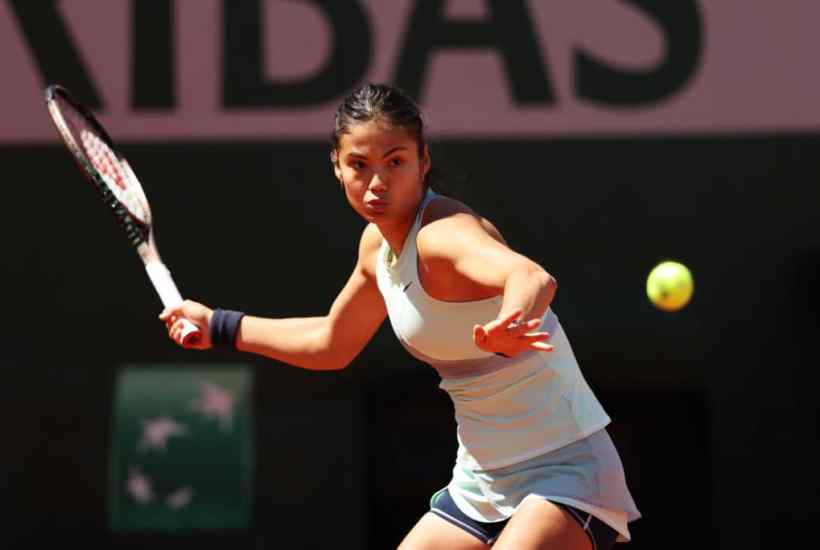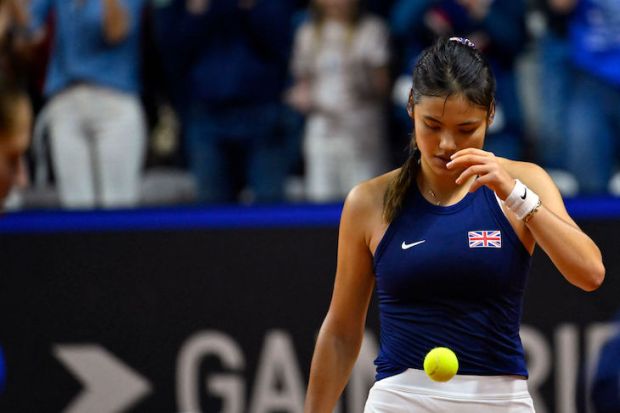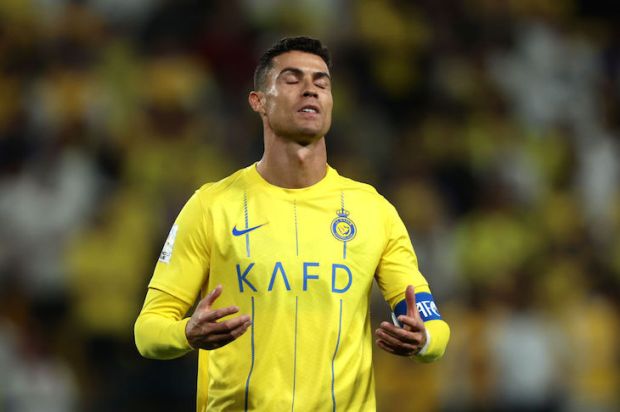If there is one thing that could salvage this year’s Wimbledon it would be a decent showing by the tournament’s undoubted star attraction: Emma Raducanu. Engulfed in a controversy of its own making since it banned Russians and Belarussians players in response to the war in Ukraine, and facing the loss of rankings points as a result, Wimbledon 2022 is desperately in need of a feel-good story and some positive publicity. The public will be similarly demanding. The US Open Champion may be expected to bear an especially heavy burden in her second Wimbledon appearance. But is it realistic, or fair, to expect her to shoulder it?
Raducanu has won just nine and lost 12 of her tour matches since Flushing Meadows and was most recently well beaten in the French Open by the Belarussian world number 47 Aliaksandra Sasnovich (Raducanu is ranked 12th). Various theories have been advanced to explain her apparent protracted ‘after the Lord Mayor’s show’ slump. The player herself believes she may now have ‘a target on her back’ with her dramatically elevated status helping motivate opponents who a year ago might have mistaken her for a ball girl. Others point to a natural preference in her game for the hard and true surface of the US Open’s Flushing Meadows as opposed to the fickleness of the brick dust of European venues like Roland Garros. Some say she’s been ‘overwhelmed’ by sudden fame; others reference her injury niggles.
Much has also been made of her high turnover of coaches. Raducanu’s father apparently believes coaches have one specific area of expertise which should be quarried, until the deficiency has been addressed, after which they should be replaced with a coach with a different specialty. The thinking, it seems, is that piece by piece this is the way to assemble the perfect tennis player. Yet this rather complicated and unorthodox approach has provoked some high-level criticism: commentator John McEnroe has declared himself baffled by it.
All of this may be valid, but there is an alternative answer to the Emma Raducanu conundrum, which is simply that it is unfair to expect her to repeat her greatest success, at least not yet, and that, all things considered, she is doing fine. In the hyper competitive world of professional tennis, for a still developing player who just a year ago was ranked 364th and was playing in front of a few hundred at the Connaught Club in Chingford, her progress has been remarkable.
Indeed, to calculate Raducanu’s true level, there is an argument for subtracting the US Open from the equation altogether. Raducanu’s victory was phenomenal, with the phenomenon in question being perhaps the rare but thrilling, and slightly surreal, spectacle of the come-from-nowhere victory, from which little can be deduced about the victor’s true strength, or likely career outcome.
Consider potentially analogous cases: in 1978 unseeded Chris O’Neil won the Australian Open but failed to get beyond a quarter final thereafter. Or in other sports: in 1986, 150-to-1 outsider Joe Johnson won the Snooker World Championship, but rarely featured in the latter stages again. He went on to have a respectable career, reaching one more World Championship final and winning a few lesser events. Keith Deller won darts’ World Championship as a qualifier in 1983 but failed to qualify the following year and apart from the odd flourish here and there saw his career fizzle out. In team sports there is the classic example of Leicester City, who won the English Premier League in what still seems like something of a dream sequence season back in 2016. They have done reasonably well since then, but a repeat of that unique achievement seems highly unlikely.
The common denominator in all these cases is that talented individuals, liberated by ultra-low expectations, can occasionally defy the laws of sporting gravity by maintaining an elevated level of performance for a protracted period. By doing so they somehow create a momentum that changes the atmosphere, making their opponents quake, and engendering a sort of film-like inevitability to what had once seemed a hugely improbable outcome.
It could even be that sport itself creates these periodic micro-miracles as a form of self-preservation. Sport is about stories after all, and if the stories become too predictable – the same old small coterie of stars winning every time, as has been the case with women’s tennis in recent years, the public loses interest.
Emma Raducanu will light up Centre Court for sure, but she probably won’t win Wimbledon. She may do reasonably well, or she may crash out in the first round. She may end her career with a vault full of trophies, or finish with just the one. She may be at the very start of her journey to a place in the game’s firmament, or she may have already peaked. It is simply too early to tell.
So, let’s remember: how Wimbledon’s organisers resolve their predicament is their prerogative. Raducanu is only 19 and the tournament’s mess is not her responsibility to clear up. And let’s lighten her load by not expecting her to redeem what might be irredeemable by repeating what might be unrepeatable.
Got something to add? Join the discussion and comment below.
Get 10 issues for just $10
Subscribe to The Spectator Australia today for the next 10 magazine issues, plus full online access, for just $10.




















Comments
Don't miss out
Join the conversation with other Spectator Australia readers. Subscribe to leave a comment.
SUBSCRIBEAlready a subscriber? Log in